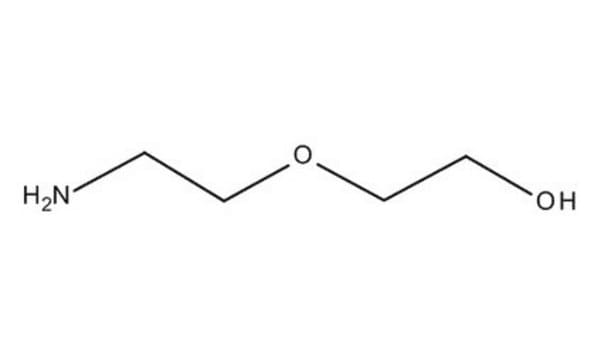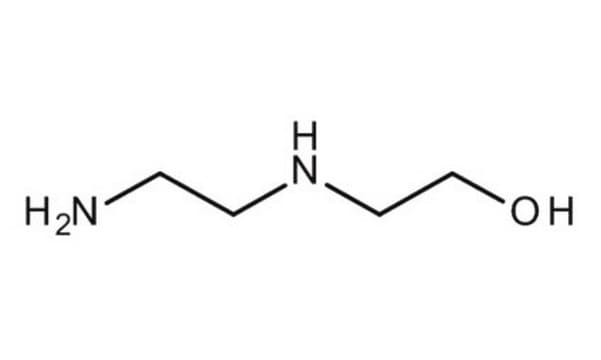A54059
2-(2-Aminoethoxy)ethanol
98%
Synonym(s):
Diethylene glycolamine
Sign Into View Organizational & Contract Pricing
All Photos(1)
About This Item
Linear Formula:
NH2CH2CH2OCH2CH2OH
CAS Number:
Molecular Weight:
105.14
Beilstein:
906728
EC Number:
MDL number:
UNSPSC Code:
12352100
PubChem Substance ID:
NACRES:
NA.22
Recommended Products
Quality Level
Assay
98%
form
liquid
bp
218-224 °C (lit.)
density
1.048 g/mL at 25 °C (lit.)
SMILES string
NCCOCCO
InChI
1S/C4H11NO2/c5-1-3-7-4-2-6/h6H,1-5H2
InChI key
GIAFURWZWWWBQT-UHFFFAOYSA-N
Looking for similar products? Visit Product Comparison Guide
Related Categories
Application
2-(2-Aminoethoxy)ethanol is commonly used as a spacer/linker in the synthesis of bioconjugate materials for applications such as drug delivery and protein labeling. It is also employed as a receptor chain in the preparation of carboxamidoquinoline based water-soluble, ratiometric fluorescent zinc sensor.
Signal Word
Danger
Hazard Statements
Precautionary Statements
Hazard Classifications
Eye Dam. 1 - Skin Corr. 1B
Storage Class Code
8A - Combustible corrosive hazardous materials
WGK
WGK 1
Flash Point(F)
260.6 °F
Flash Point(C)
127 °C
Personal Protective Equipment
dust mask type N95 (US), Eyeshields, Gloves
Choose from one of the most recent versions:
Already Own This Product?
Find documentation for the products that you have recently purchased in the Document Library.
Customers Also Viewed
C Tournaire-Arellano et al.
Carbohydrate research, 314(1-2), 47-63 (1999-05-07)
Ureido and thioureido derivatives of 2-acetamido-2-deoxy-beta-D-glucose, 1-amino-1-deoxy-D-glucitol and 2-(2-aminoethoxy)ethanol were prepared as N-acetyl-beta-D-hexosaminidase (NAHase) inhibitors and were evaluated on Trichomonas vaginalis NAHase. Although none showed complete inhibition of the enzyme at 100 microM, 1-amino-1-deoxy-D-glucitol derivatives acted as competitive inhibitors of
Ratiometric and water-soluble fluorescent zinc sensor of carboxamidoquinoline with an alkoxyethylamino chain as receptor.
Zhang, Yu et al.
Organic Letters, 10(3), 473-476 (2008)
Cao-An Vu et al.
ACS omega, 4(12), 14765-14771 (2019-09-26)
Silicon nanowire field-effect transistors (SiNW-FETs) have been demonstrated as a highly sensitive platform for label-free detection of a variety of biological and chemical entities. However, detecting signal from immunoassays by nano-FETs is severely hindered by the distribution of different charged
Superresolution imaging of targeted proteins in fixed and living cells using photoactivatable organic fluorophores.
Lee, Hsiao-lu D et al.
Journal of the American Chemical Society, 132(43), 15099-15101 (2010)
B Combourieu et al.
Applied and environmental microbiology, 64(1), 153-158 (1998-01-22)
Resting Mycobacterium aurum MO1 cells were incubated with morpholine, a waste from the chemical industry. The kinetics of biodegradation was monitored by using in situ nuclear magnetic resonance (NMR). The incubation medium was directly analyzed by 1H NMR. This technique
Our team of scientists has experience in all areas of research including Life Science, Material Science, Chemical Synthesis, Chromatography, Analytical and many others.
Contact Technical Service![2-[2-(2-Aminoethoxy)ethoxy]ethanol ≥96.0% (GC)](/deepweb/assets/sigmaaldrich/product/structures/237/185/b94eadd2-5a2c-4a5b-a13d-3d3905df0dbc/640/b94eadd2-5a2c-4a5b-a13d-3d3905df0dbc.png)













![2-[2-(Dimethylamino)ethoxy]ethanol 98%](/deepweb/assets/sigmaaldrich/product/structures/194/219/0fc5e46a-3a2e-48e4-b3b3-c63b710a5f99/640/0fc5e46a-3a2e-48e4-b3b3-c63b710a5f99.png)
